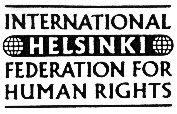

International Helsinki Federation for Human
Rights
Rummelhardtg. 2/18, A-1090 Vienna, AUSTRIA
Tel. +43-1-402 73 87, 408 88 22
Fax +43-1-408 74 44
E-mail: office@ihf-hr.org
Internet: http://www.ihf-hr.org/
ANNUAL REPORT 1999
AUSTRIA
Religious Tolerance
The Austrian system of relationships between the state and religious communities is historically rooted in the principle of recognition and non-recognition of religions. Until 1998, the Austrian religious system was based on a two-tiered system with churches and religious societies recognized by law (Religionsgemeinschaften) on the one hand, and religious organizations registered according to the Law on Associations.
In January 1998 a new law went into effect establishing an intermediary third category of religious denominational communities (Religiöse Bekenntnisgemeinschaften) officially registered but not recognized by law.
In 1998, twelve religions fell into the first category of recognized churches and religious societies. According to article 15 of the Fundamental Law, they enjoyed the juridical status of a corporation of public law (Körperschaft öffentlichen Rechts). This privileged status was tied to a series of advantages such as exemption from property taxes, entitlement to state-collected church taxes (Kirchenbeitrag), the right to engage in religious education in public schools, to receive subsidies for running private schools, to air radio and TV broadcasts, immunity from securing work or residence permits for foreign religious workers who act as ministers, missionaries or teachers, and so forth.
Legal recognition could be obtained by a special law or by a special decree issued by the competent Ministry of Education and Culture on the basis of a general law about the recognition of churches and religious societies (Anerkennungsgesetz), which dates back to the Austrian monarchy (1874) and remained in force throughout 1998. In 1992, the government issued a decree giving the possibility for religious societies to obtain the status of juridical person on the basis of the Law on Associations, a practice existing for almost 20 years, though, with no strong legal basis.
The new law of 1998 set out additional criteria for religious denominational communities for possible recognition as a "state recognized church or religious society." These additional criteria forced such communities to wait for a minimum of 10 years for the recognition procedure and to prove its existence for at least 20 years in Austria. Furthermore, the number of adherents of a community must reach a minimum of 16,000 (0.2 percent of the Austrian population). With these additional criteria, the Austrian government introduced a double standard of recognition, which is detrimental to any new "competitor" with the religious establishment and purposefully discriminatory, since only four of the twelve already recognized churches and religious societies in Austria meet this qualification.
The new religious legislation will enable the state to deny legal status to so-called "cults" – which are often deemed as "harmful" – including Pentecostal and other small Protestant churches, and therefore will block their development.
The Austrian Congregation of Jehovah’s Witnesses, which numbered about 21,000 members and had been applying for years for the status of state-recognized religion - without getting any reply from the relevant authorities - will now have to wait for 10 years before being able to introduce an admissible application. Human Rights Without Frontiers suspected that the new legislation was pushed through with such haste because Jehovah’s Witnesses were on the verge of forcing a decision from the Constitutional Court with regard to their application for recognition after they had been persistently ignored and put on hold by the Ministry of Education and Culture for the last 30 years.
In July the Ministry of Education granted the status of a religious denominational community to eight religious communities, including Jehovah’s Witnesses, Baptists and Seventh Day Adventists. The Ministry rejected the application of the Sahaja Yoga group while the Church of Scientology and the Hindu Mandir Association withdrew their applications